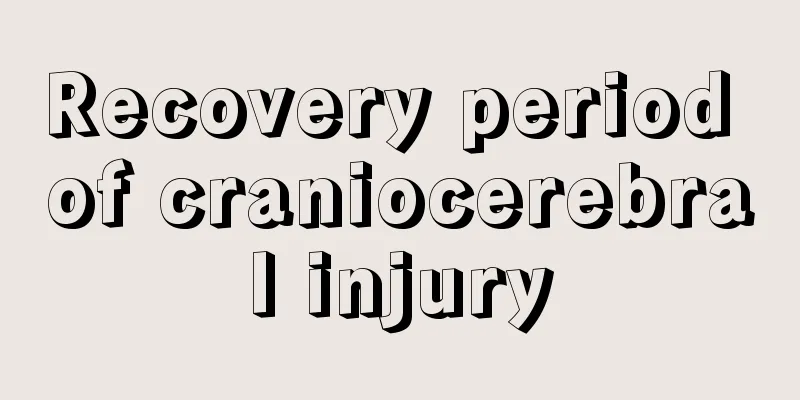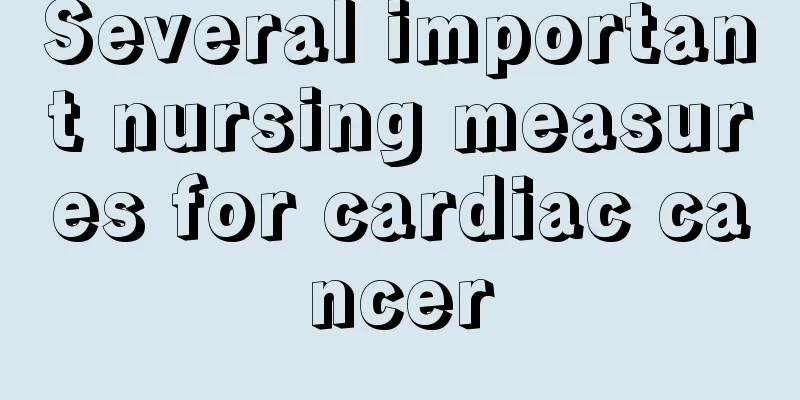Recovery period of craniocerebral injury

|
The recovery period for craniocerebral injury is relatively long. We should follow the doctor's advice to take good care of ourselves after surgery, and pay attention to our diet, brain protection, wound treatment, etc. When recovering from craniocerebral injury, we need to undergo regular checkups, get more rest, and avoid emotional excitement. We must follow the doctor's advice to arrange hospitalization and surgery, and observe the treatment of the disease. Five common misconceptions about brain injury recovery One misconception: I just had a head injury. Since the doctor said I can be discharged from the hospital, I am completely healed. I don’t have any other illness and don’t need a follow-up examination. In fact, after a head injury, it takes a long time for the bleeding in the head to be fully absorbed. Even if you can be discharged from the hospital or the symptoms have disappeared, it does not mean that the bleeding in the head is completely absorbed. There is also the possibility of recurrence of some bleeding. Therefore, it is generally recommended to have a follow-up examination 1 to 3 months after discharge to check the recovery of the head injury and the absorption of bleeding. For patients who have undergone surgical treatment, the doctor should also check the wound healing condition, etc. Myth 2: The injury is to the brain, so don’t move around during the recovery period, just lie in bed and rest! In fact, when patients are in the recovery period after brain trauma, the first priority is functional training and recovery. The rehabilitation of patients with brain trauma should continue from the acute phase to the recovery phase, or even for life. Some patients with brain trauma are still bedridden and unable to move during the recovery phase. During the bedridden period, many family members "dare not move" the patients when taking care of them. However, long-term bed rest will not only damage the integrity of the patient's skin, but also cause contracture of the joints and muscles, making it impossible for the patient to move like a normal person. Therefore, during the recovery period, even while bedridden, patients should be helped to do systematic and effective limb activities to lay the foundation for the recovery of their limb functions. Myth 3: After undergoing a craniotomy following a brain injury, your vitality is damaged, so you must replenish your energy as much as possible! A craniotomy after a brain trauma does have a great impact on the patient's body. Nutrition should be increased during the recovery period, but it is not advisable to blindly supplement the patient. Letting the patient eat is not "the more the better". The diet should be reasonably matched. It is not advisable to eat a lot of animal oil and animal offal, etc. It is not advisable to eat spicy and irritating foods. These foods are not only difficult to digest, but also have a great irritation to the gastrointestinal tract, which increases the burden on the gastrointestinal tract and can also cause constipation, vomiting and other discomforts. You can eat more cereals, beans, milk, vegetables, fruits, and more crude fiber foods to keep the bowels open. Myth 4: The doctor cannot discharge us from the hospital because we have not fully recovered to our pre-injury condition! Rehabilitation from brain trauma is often a long process. Most general hospitals and neurosurgery hospitals in my country are responsible for the functions of "treatment and nursing", while the later stages of brain trauma often fall into the category of "rehabilitation medicine". Patients should listen to the doctor's advice after their head injuries stabilize, and be discharged or transferred to another hospital for systematic rehabilitation and functional training at an appropriate time. Some injuries caused by traffic accidents are often reluctant to be discharged from the hospital even when their condition has stabilized and they can go home to recuperate due to issues such as compensation and liability. However, the hospital environment is relatively complex, with various bacteria and viruses common, making cross-infection prone to occur. This is especially true for the elderly and frail patients with other diseases. Once pneumonia and other problems occur, the consequences will outweigh the benefits. Myth 5: A family member has had a serious head injury and was in a coma. Now that he is well, we don’t want him to do anything. We will take care of him! After a brain injury, sequelae of varying degrees and manifestations will appear, such as language disorders, hearing impairments, limb movement disorders, memory loss, insomnia, irritability, etc. Most of the sequelae cannot be improved by "nursing". During the recovery period, family members should maintain the patient's social attributes as much as possible while taking care of the patient, allowing the patient to do what he can and encouraging the patient to participate in normal work and life. Only in this way can the patient's psychological disorders caused by trauma be intervened and corrected, which is beneficial to the patient's physical and mental health, build confidence in the patient, maintain the patient's dignity, and help the patient return to society to the greatest extent possible. |
>>: Spinal cord injury classification method
Recommend
There are seven groups with a high risk of pancreatic cancer
Recently, the incidence of pancreatic cancer has ...
Pinching a woman here can predict health risks
We know that the condition of nails or fingers ca...
Is mania hereditary?
Patients with mania are often more manic and have...
Causes of colorectal cancer
What factors are related to the cause of colorect...
New method to prevent osteosarcoma
Many people are afraid of osteosarcoma, which is ...
What are the causes of prostate cancer
The occurrence of prostate cancer may be related ...
How to pickle garlic with soy sauce
If people in the north know this, they will know ...
What's the matter with the low neutrophil ratio
When looking at the routine blood test report, wh...
What is the role of bile drainage
Bile drainage refers to a surgery that drains bil...
What are the symptoms of advanced liver cancer?
Advanced liver cancer refers to cancer cells >...
What are the sequelae after wisdom tooth extraction
Wisdom teeth refer to the teeth that grow after p...
Is liver cancer preventable and treatable? Who are the high-risk groups for liver cancer?
Prevention of liver cancer starts with "earl...
What is the best dietary treatment for nasopharyngeal cancer and how to care for it
Although nasopharyngeal cancer is difficult to tr...
Why do we need a colonoscopy
Many patients with gastrointestinal diseases need...
What does platelet antibody mean
When examining platelets, platelet antibody testi...









